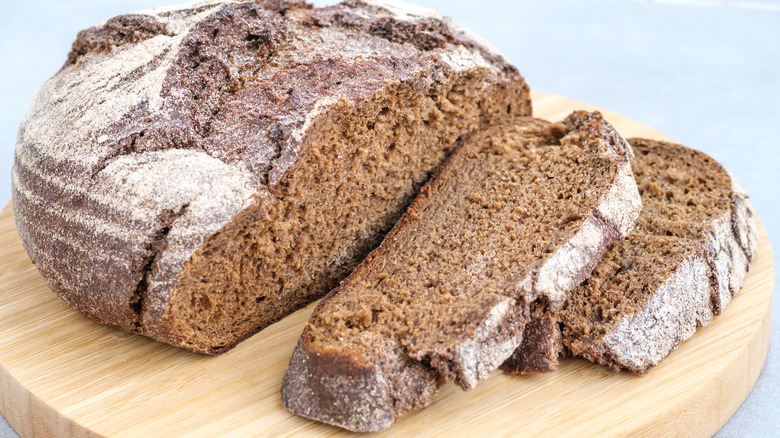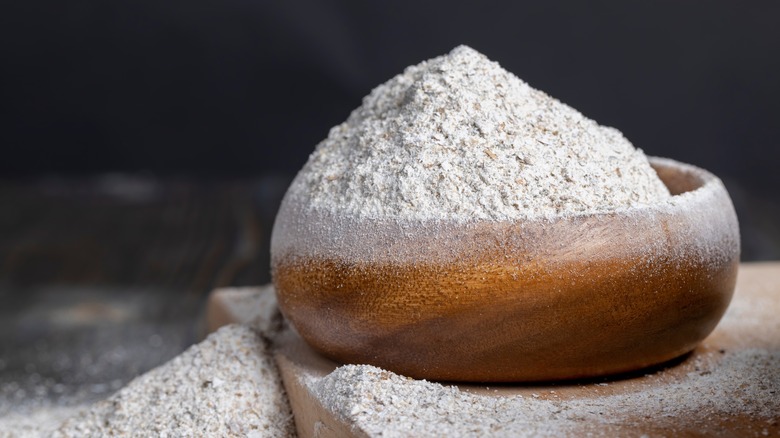How To Choose The Best Type Of Rye Flour To Bake With, According To Our Bread Expert
In the world of bread baking and alternative flours, rye is a bit of an anomaly. The vast majority of flour types used for bread come from wheat, whether it's whole wheat, bread flour, or just standard all-purpose flour. Then, you have the non-wheat options, like cornmeal, which have unique flavors but also properties that are pretty different from wheat.
Rye falls in a tough middle ground. It is a cereal that is closely related to wheat, but it's not actually wheat. It contains a similar structure and does have some gluten, unlike other alternative flours, but a lot less of it than wheat. So when you are baking bread, all of those different properties combine to make rye a confusing option, especially since, like wheat flour, there are a bunch of different types of rye flour to choose from. So Tasting Table reached out to a bread expert, Nathan Myhrvold, the founder of Modernist Cuisine and co-author of Modernist Bread at Home, to sort this all out for us.
It may not surprise you to learn that, according to Myhrvold, "The rye flour you choose will depend on what kind of rye you want to make." He told us that "Density is an important consideration when it comes to rye breads." Myhrvold also said that picking the right style of rye goes a long way in determining that. And with the rye options you'll find at most stores, he zeroed in on two factors to consider: grind size and the darkness of the flour.
For fluffier rye bread, go with lighter rye and a finer grind
Many of us love the classic fluffy wheat bread texture, and if you want to get close to that with just rye flour, Myhrvold says, "Use the lightest, finest rye flour you can find." He explained, "In Germany and Austria, where you'll find fluffy rye breads, flour producers know this and mill their rye bread flour very finely; they also remove all the bran and germ." However, in the United States, even the most fine rye flour is more coarse than in Europe and usually includes some bran and germ. To mimic the European rye flour, Myhrvold advises, "If you grind and sift a U.S. rye flour further, your results will be substantially better."
Myhrvold told us that for American style rye bread that falls on the softer end, a mix of rye flour and wheat flour is typically used — usually between 10%-29% rye. He says, "They combine the best of both worlds: the structure and open crumb of bread flour, and the moisture and chewiness of rye flour." Because the higher gluten wheat flour is helping out the structure and makes up the majority of the recipe, Myhrvold explained that it's possible to get a lighter bread in these recipes using medium or even dark rye flour. He even says that for his own recipes, this mix produces "wonderfully deep and complex flavors."
For denser rye breads, dark rye flour can make up the majority of the mix
The next level is what Myhrvold calls "intermediate ryes," which he says have "a solid backbone of wheat, with varying degrees of rye, usually somewhere between 30% and 59%." These styles straddle the line between your lighter loaves and the high-density of breads made with 100% rye flour. For these, you can try medium rye flour, which offers a nice balance of rye flavor and softer texture, or go up to the almost 100% whole grain dark rye flour. Myhrvold explained that these recipes are all sourdough based, which may make them a challenge if you aren't used to working with sourdough bread, but they can have a great payoff too. Myhrvold says, "They retain some of the characteristic chewiness of wheat bread and elasticity from the wheat gluten but still have a very distinct rye aroma and texture."
Finally you have your very dense rye breads, which Myhrvold told us usually contain over 60% rye. One bread emblematic of the style that he likes is Vollkornbrot, which Myhrvold calls, "An iconic German bread that offers a rye-on-rye experience," as it is also studded with soaked rye berries. These would also include traditional German pumpernickel. Pumpernickel flour is just 100% whole rye, making it great for these breads along with dark rye; just be prepared, as Myhrvold calls them "brick-like," but it's a texture many people, including his team, enjoy.


